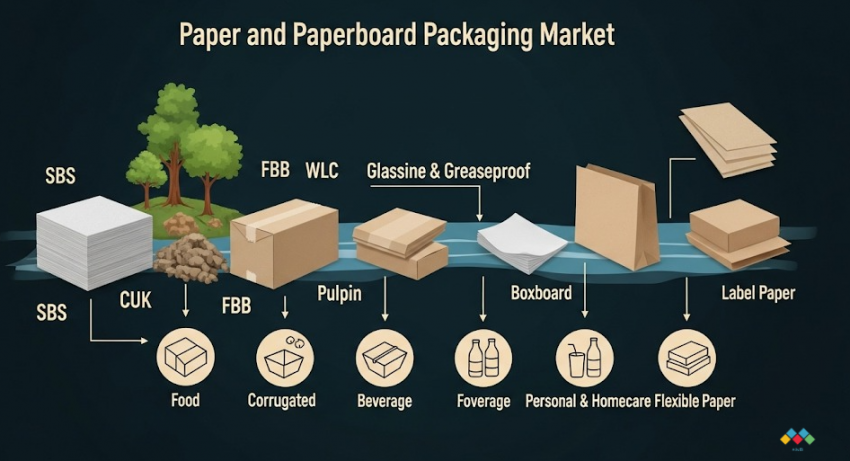The packaging industry is at a crossroads, and the path forward is paved with renewable materials. The paper & paperboard packaging market has gained immense traction in recent years, becoming a preferred choice for industries seeking sustainable, recyclable, and versatile packaging alternatives. Whether it’s a folding carton on a retail shelf, a corrugated box for e-commerce delivery, or a paper-based tray for ready-to-eat meals, the shift away from plastic is clear—and it’s gaining momentum globally.
Paper & Paperboard Packaging Market was valued at USD 379.9 billion in 2024, and it is projected to reach USD 451.8 billion by 2030, at a CAGR of 2.9%.
Several factors are driving this shift. First, consumer expectations are changing rapidly. Buyers today are more conscious of environmental impacts and are actively supporting brands that demonstrate a commitment to sustainability. In response, companies across food & beverage, cosmetics, pharmaceuticals, and retail are adopting paper-based packaging to reduce their carbon footprint and plastic usage. This is especially true in urban and high-growth markets, where the demand for recyclable packaging solutions is no longer just a preference—it’s a requirement.
Paper and paperboard are incredibly adaptable materials. From corrugated boxes that safeguard goods in transit to folding cartons that display branding beautifully on store shelves, they serve both functional and aesthetic needs. Additionally, innovations in coated paperboard have made it possible to protect products from moisture and grease without compromising recyclability. As a result, industries such as foodservice, e-commerce, and consumer electronics are investing heavily in custom paper packaging solutions that are both protective and planet-friendly.
Another major factor influencing the market is regulation. Governments around the world are phasing out single-use plastics and implementing mandates that favor recyclable and compostable packaging. Europe has been especially aggressive in this regard, with laws encouraging extended producer responsibility (EPR). The United States and several parts of Asia-Pacific are also pushing for packaging waste reduction targets. This policy environment is creating a fertile ground for growth in the paper & paperboard packaging industry, particularly for paper packaging manufacturers who can meet eco-design requirements.
The rise of e-commerce has also played a huge role. As more goods are shipped directly to consumers, there’s a growing demand for strong yet lightweight corrugated paper packaging. Brands are seeking ways to reduce dimensional weight, eliminate plastic fillers, and still ensure products arrive safely and securely. Paperboard packaging provides a compelling solution—it’s sturdy, customizable, and easily printed with branding or instructions. Many companies are also exploring paper-based e-commerce packaging with tamper-proof seals and easy-to-open designs to improve the unboxing experience.
From a design and branding standpoint, paper packaging offers a tactile, premium feel that aligns well with clean, minimalist, or natural product aesthetics. For instance, food-grade paper packaging is being used not only for its performance but also for the perception of safety and cleanliness it conveys. Meanwhile, custom paperboard cartons allow premium brands to stand out with embossed logos, textured finishes, and sustainable messaging—all without the plastic guilt.
In emerging markets, especially across Asia and Latin America, the paperboard packaging market is booming as businesses modernize and localize their supply chains. Increased urbanization, growth in organized retail, and rising middle-class consumption are all feeding the demand for safe, attractive, and eco-friendly packaging. At the same time, manufacturers are investing in machinery and technologies that improve the efficiency of paper-based packaging production, making it more cost-competitive than ever before.
Download PDF Brochure For Deeper Insights :
Looking ahead, the paper & paperboard packaging market is set to grow not just in volume, but in strategic importance. It’s becoming a symbol of corporate responsibility and environmental stewardship. For packaging professionals, procurement managers, and sustainability officers, the message is clear: investing in paper-based packaging isn’t just about keeping up—it’s about moving ahead. Whether you’re shipping a pair of shoes, delivering a frozen meal, or wrapping a luxury skincare product, the right paper solution delivers more than protection—it tells a story of intent and innovation.

